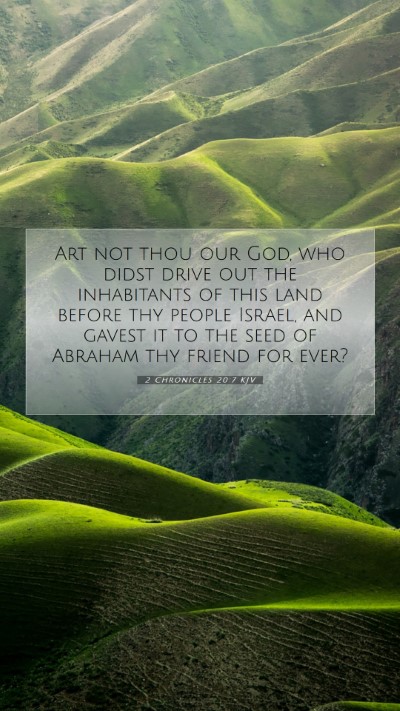Understanding 2 Chronicles 20:7
Bible Verse: “Art not thou our God, who didst drive out the inhabitants of this land before thy people Israel, and gavest it to the seed of Abraham thy friend for ever?” (2 Chronicles 20:7)
Overview of the Verse
This verse is part of King Jehoshaphat’s prayer to God during a time of crisis when Judah faced a significant military threat. Jehoshaphat appeals to God’s past actions to encourage faith in His continued protection and assistance.
Insights from Public Domain Commentaries
Matthew Henry’s Commentary
Historical Context: Matthew Henry highlights the importance of recalling God's past interventions as a means of strengthening one’s faith. He emphasizes that Jehoshaphat acknowledges God’s sovereignty and past help as foundational for his plea for help in the present.
The Covenant Relationship: Jehoshaphat’s reference to Abraham denotes the everlasting covenant God made with Him. Henry expounds that this reflects God’s commitment to His people based on covenantal faithfulness and relational history.
Albert Barnes’ Notes
Divine Justice: Barnes elaborates on how Jehoshaphat appeals to God’s justice in driving out other nations from the Promised Land to establish Israel. This is significant for understanding the divine purpose behind Israel’s possession of the land.
Importance of Prayer: He notes the model of prayer presented here, whereby Jehoshaphat not only acknowledges God’s past deeds but also seeks reaffirmation of God’s present involvement. This underlines the essence of prayer in seeking divine intervention in dire circumstances.
Adam Clarke’s Commentary
Recognition of God's Authority: Clarke emphasizes that the phrase “Art not thou our God” signifies a profound recognition of God’s ownership and dominion over the land. He underscores the importance of collective identity as God’s chosen people during crises.
Reflection of Promise: Adam Clarke highlights the significance of referring to Abraham as “thy friend” to evoke the assurance of God’s promises. This indicates a relationship characterized by trust and favor, which Jehoshaphat leans upon during troubling times.
Summarized Meaning of the Verse
2 Chronicles 20:7 embodies a profound moment of intercession where Jehoshaphat recalls God’s past acts of deliverance and covenant faithfulness. By invoking the memory of Abraham, he emphasizes the ongoing relationship between God and His people and their reliance on His past performances for reassurance in present adversity. This can inspire believers in their own prayer lives, emphasizing the importance of recalling God’s history with His people when facing challenges.
Significance of the Verse
The verse not only serves as a testimony of God’s power and benevolence towards Israel but also illustrates how recognizing God's past involvement can provide assurance in times of fear. It’s a reminder that the same God who has acted decisively in the past is fully capable of intervening again.
Bible Cross References
- Genesis 12:1-3 - God’s promise to Abraham
- Exodus 15:16 - Recognition of God’s deliverance from Egypt
- Psalm 106:45 - God’s faithfulness and mercy towards Israel
Conclusion
This verse encourages believers to remember God's faithfulness in their lives as a source of strength. The practices of prayer, reflection on Scripture, and community engagement such as Bible study groups can deepen one’s understanding and application of such verses. The teachings from this verse can serve as valuable Bible study insights for individuals and groups aiming to enhance their spiritual growth and reliance on divine promises.
SEO Keywords Recap
This interpretation of 2 Chronicles 20:7 provides a thorough Bible verse commentary and Biblical exegesis, contributing to a more profound understanding Scripture through careful historical context analysis and theological reflection.


